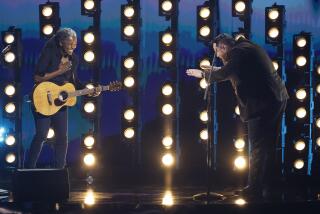Hawaii loves its slack key, but gee
- Share via
It’s hard to imagine a more relaxing sound than the sun-kissed melodies of Hawaii, so why are so many island artists playing through gritted teeth these days? The answer is in the envelope at the Grammy Awards: The island music scene had to lobby for two decades to claim its own Grammy category, but now, three years in, that category has been a galling source of discord on the islands.
Simply put, there’s just been too much slack in the category to suit many Hawaiian artists.
The first two Grammys awarded for best Hawaiian music album went to slack key guitar projects, and there’s a good chance that trend will continue at the 49th annual Grammy Awards this Sunday since three of the five nominees are specialists in slack key, the dreamy style that is based in a unique tuning and the six-string finger methods that originated on the Pacific islands in the mid-1800s.
“There has been a lot of controversy surrounding the Hawaiian music category at home,” said artist-producer Daniel Ho, who won the genre’s Grammy last year for a multiartist album and is nominated this time for another called “Legends of Hawaiian Slack Key Guitar: Live From Maui.” “We have all different kinds of Hawaiian music and really famous artists who are prominent in the Hawaiian music scene. But in terms of Grammys, slack key guitar albums have overshadowed other traditional musical forms because of the voting members who live on the mainland.”
The Grammys have a clumsy history when it comes to the early years of new categories and making sure they end up in the right hands. The most infamous case was in 1989 when the hard rock/metal category was added and academy voters gave the inaugural award to the flute-laced prog-folk of Jethro Tull.
The next year, though, the more appropriate Metallica took the trophy, which might mean the 16,000 voting members of the academy will make different choices in the Hawaii category in years to come. Right now, it’s clear that those voters hear slack key as the defining sound of the 50th state.
“The funny part is, we’re the black sheep of the music industry on the island,” says producer Milton Lau, a three-time slack key nominee with two albums in the race this year. “We’re not at all the most popular form of music at home, in terms of airplay. So all the island guys who get the publicity are pretty angry with us because they keep getting upstaged.”
It’s more than a matter of music taste too, because of backbeat issues of cultural identity. The first Hawaiian music Grammy went to Charles M. Brotman for “Slack Key Guitar: Volume 2.” In the islands, the album had been viewed as an underdog running against native veteran acts in the Brothers Cazimero, Amy Hanaiali’i Gilliom and Keali’l Reichel.
Brotman, a native of Mercer Island, Wash., had lived in Hawaii more than a decade, but his return flight to Honolulu wasn’t greeted with cheers. There were racially charged complaints in the local media and accusations of artistic carpetbagging.
“Hawaiians, like many native peoples, resent what Caucasians have done to native culture, and many people saw that first Grammy win as another slap in the face,” says Tim Ryan, a freelance journalist who covers Hawaiian music.
The rancor has been discouraging. The Hawaiian Academy of Recording Arts spent two decades campaigning to get Grammy notice for the island’s music, which has an emphasis on the vocal genres (such as hula chants or hula kahiko, which predate the 17th century importation of stringed instruments).
Marlene Sai, president of the Hawaiian Academy of Recording Arts, explained: “The melodic line is secondary. Some argue that vocal performance of the Hawaiian language is Hawaiian music.”
Despite that historical context, the sense at the moment is that only one Hawaiian sound is reaching the mainland, and it’s an instrumental one. One reason: The slack key artists had more touring opportunities in the mainland in recent decades and more industry connections and awareness.
“I know people on the HARA board are shaking their heads, saying, ‘What do we have to do to get rid of these guys?’ ” Lau says.
National Academy of Recording Arts and Sciences officials say that any angst regarding the young category should be considered the expected “growing pains,” as senior vice president for awards Diane Theriot put it last week.
Maybe so, but there’s already a Hawaiian Academy of Recording Arts-led move afoot to add a category to highlight Hawaii’s vocal artists. That seems like a long shot considering that there are only 100 Hawaiian members in the National Academy of Recording Arts and Sciences.
Instead of splitting sounds, maybe the solution is a meeting of the musical minds: Lau, nominated this year for “Hawaiian Slack Key Kings,” has approached fellow two-time nominee Hanaiali’i Gilliom, a noted vocalist, about recording together.
“Hawaiians love her now, but everybody will love her even more when she’s got the Slack Key Kings with her,” he said. “My whole philosophy is, ‘Why fight it? Just join it.’ ”
More to Read
The biggest entertainment stories
Get our big stories about Hollywood, film, television, music, arts, culture and more right in your inbox as soon as they publish.
You may occasionally receive promotional content from the Los Angeles Times.










